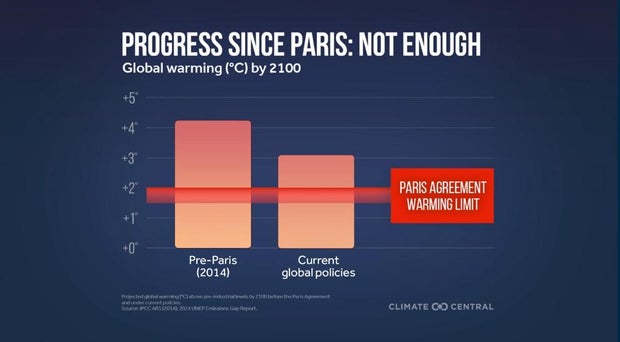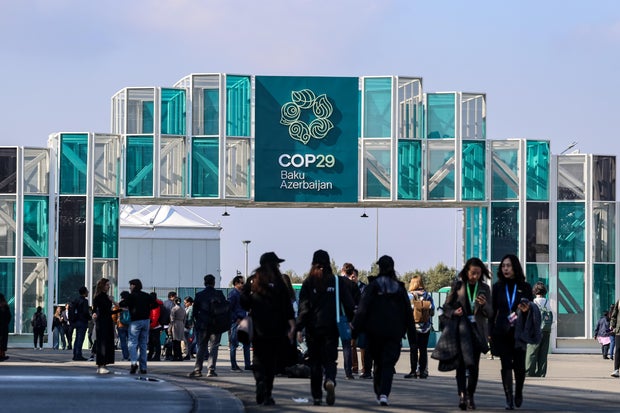As delegates from nearly 200 countries gather for a major international summit on addressing the threat of climate change, they’re confronting a new era of uncertainty for the United States’ climate commitments in the wake of Donald Trump’s presidential election victory.
Trump has said that in a second term, he would again exit the Paris Climate Agreement, an accord signed in 2016 aiming to reduce greenhouse gas emissions and limit global warming to no more than 1.5 degrees Celsius above pre-industrial levels. The U.S. formally withdrew during Trump’s first term, but then rejoined under President Biden.
CBS News has reached out to the Trump transition office for more information about his plans.
The United States joined the United Nations Framework Convention on Climate Change, an international treaty, in 1992 and has attended its conferences — known as COP, for “Conference of Parties” — in many years since, most recently last year’s COP28 in Dubai.
Project 2025, the conservative blueprint drawn up by the Heritage Foundation for the next GOP administration — which the president-elect has endeavored to distance himself from — calls for the U.S. to withdraw from both the U.N. Framework Convention on Climate Change and the Paris Agreement.
What is COP29?
This year’s United Nations Climate Change Conference — called COP29, since it’s the 29th Conference of Parties — kicks off Monday in Baku, the capital of Azerbaijan, and runs through Nov. 22.
The annual summit, which is held in a different location every year, brings together world leaders and thousands of other representatives of nations that are party to the U.N. Framework Convention on Climate Change. Their goal is to take stock of the progress on reducing greenhouse gas emissions — each country sets it own targets and action plan — and limiting global warming.
So far, the world is falling far short of meeting these climate goals.
Overall, 2023 had the highest greenhouse gas emissions ever recorded, although here are currently 42 countries where emissions are decreasing, including the United States, China, Russia and in the European Union.
Without greater reductions over the next few years, the world is on a path to see a temperature increase of more than 3 degrees Celsius, according to an October U.N. report, which warned such an outcome “would bring debilitating impacts to people, planet and economies.”
Climate Central
Under the Paris Agreement, countries update their targets for emission cuts (known as Nationally Determined Contributions, or NDCs) every five years. The next update is due in February.
Who’s going to COP29?
This year, President Biden is sending a delegation that includes John Podesta, the senior presidential adviser for international climate policy, Energy Secretary Jennifer Granholm, Agriculture Secretary Tom Vilsack and Ali Zaidi, the White House national climate adviser. Vice President Kamala Harris represented the U.S. at last year’s conference.
The gathering in Baku will be smaller than some previous summits for several reasons, including fewer attendance passes and hotel spaces, and concerns over Azerbaijan’s human rights record and its oil-production-based economy.
Dominika Zarzycka/NurPhoto via Getty Images
A number of other world leaders have opted not to attend this year, including French President Emmanuel Macron, Russian President Vladimir Putin, Brazilian President Luiz Inácio Lula da Silva and European Commission President Ursula von der Leyen. California Gov. Gavin Newsom isn’t going either, although California often has a strong presence at the conference.
Higher attendance is expected at next year’s COP30 in Brazil, whose president shown a greater commitment to tackling emissions and climate finance.
What will a Trump presidency mean for U.S. involvement in global climate efforts?
Experts say that withdrawing from major climate agreements has the potential to isolate the U.S. in global climate negotiations and could encourage other high-emitting nations like China to deprioritize their emissions reductions. Leaving the Paris Agreement would mean the U.S. does not have to report on its emissions each year, and it would have weaker legal responsibilities to provide climate finance to developing countries.
But while exiting these global commitments would be a major setback in the eyes of climate advocates, it wouldn’t stop state and local governments, businesses or nonprofits from stepping up.
In the wake of Trump’s victory, several climate advocacy organizations released a flurry of statements reiterating their commitment to clean energy investments, carbon emission reduction and environmental protection. States and local governments are also expected to continue investing in initiatives like cap-and-invest programs, carbon neutrality, and infrastructure improvements.
Other countries are also not likely to throw away their climate commitments.
“I am struck by the last time this happened, even with the shock, not a single other country followed the United States in withdrawing from the agreement,” said Jonathan Pershing, program director of environment at the William and Flora Hewlett Foundation and a former special envoy for climate change at the State Department.
Withdrawing from the Paris Agreement would take at least a year to complete, and a future president would have the power to rejoin if they so choose — just as President Biden did after Trump exited the agreement during his first term.
A withdrawal from the U.N. Framework Convention on Climate Change, on the other hand, could have an even greater long-term impact. Exiting the global treaty would remove the U.S. from the international stage of climate discussions and could hamper the country’s ability to participate in negotiations in the future. The U.S. Senate ratified joining the UNFCCC in 1992, which legal experts say could make withdrawal a more complex process.




